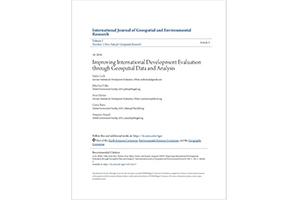Improving International Development Evaluation through Geospatial Data and Analysis
Improving International Development Evaluation through Geospatial Data and Analysis is an article written by Malte Lech, German Institute for Development Evaluation, DEval; Juha Ilari Uitto, Global Environment Facility, GEF; Sven Harten, German Institute for Development Evaluation, DEval; Geeta Batra, Global Environment Facility, GEF; and Anupam Anand, Global Environment Facility, GEF.
Abstract:
Increasing availability of new types of data strengthens geospatial research in different scientific fields and opens up opportunities to better measure results and evaluate the impacts of development interventions. This article presents examples where geospatial approaches have been applied in evaluations and thus demonstrate the potential use in informing policy design through scientifically sound evidence as well as learning.
The authors illustrate innovative ways of employing geospatial data and analysis in impact evaluations of international development cooperation. These interventions are concerned with topics such as biodiversity conservation, land degradation, sustainable use of natural resources, and disaster risk management. Recent methodological developments in the field of remote sensing and machine learning show significant potential to transform the vast body of new data into meaningful evidence aimed to improve policy and program design. The application and potential of methods are discussed in light of increasing importance of concerns over global climate change and climate change adaptation.
The authors call for enhancing mutual interaction between the geospatial research disciplines and the development evaluation community to jointly contribute to finding solutions for tackling pressing social and environmental challenges.
To download the article on the International Journal of Geospatial and Environmental Research website, click here.



